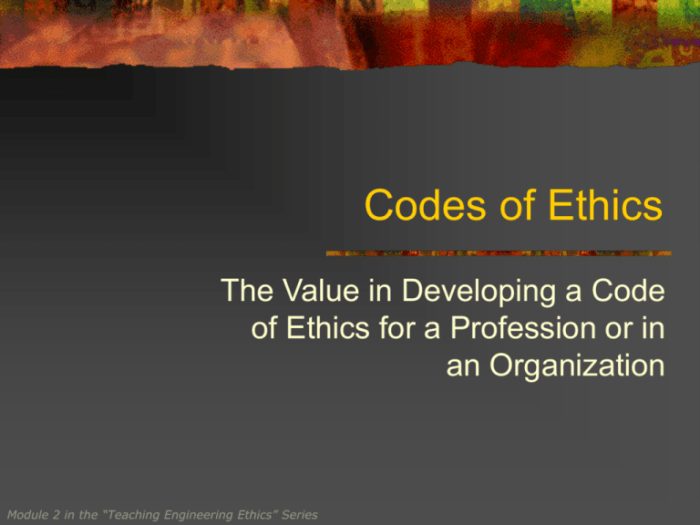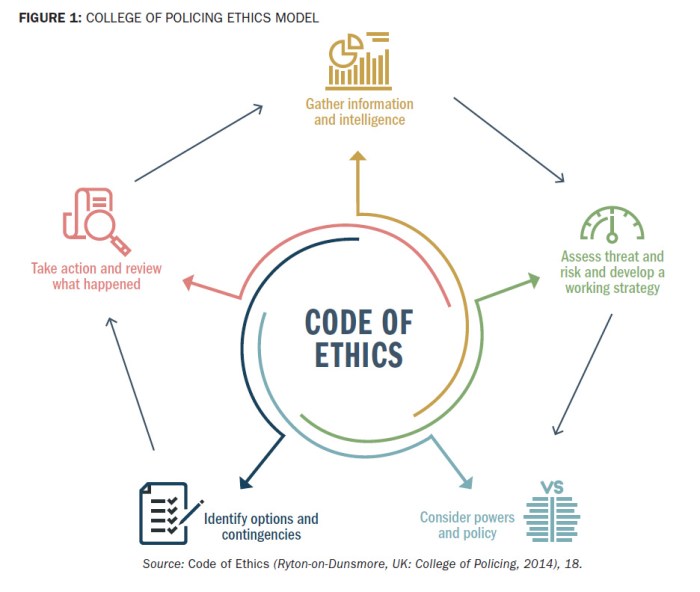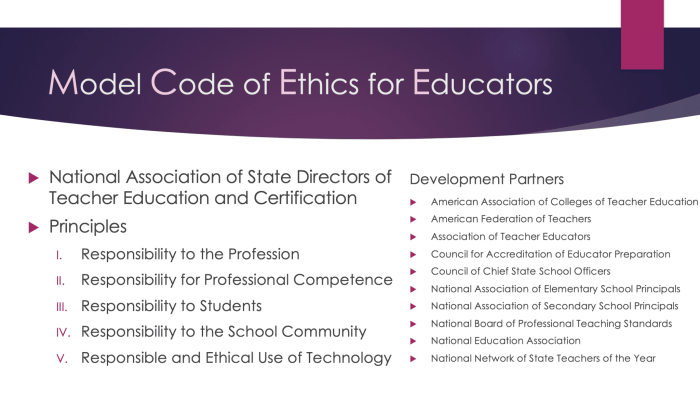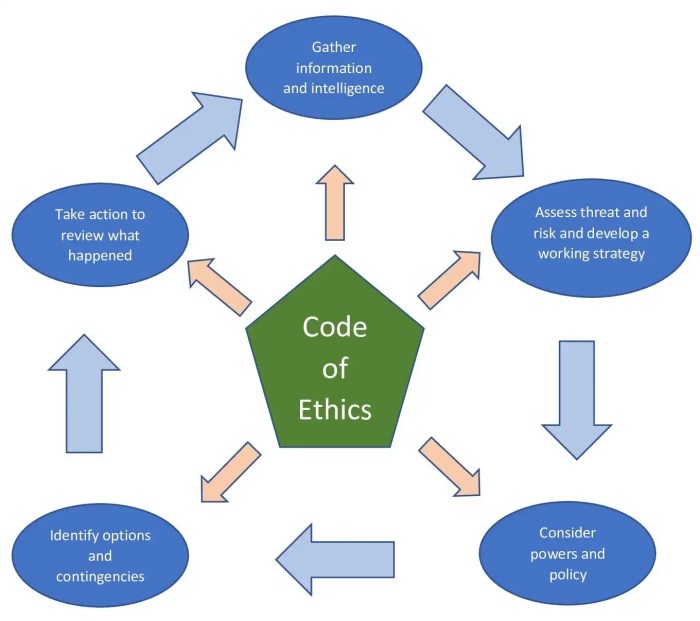Embark on an enlightening journey into the realm of ethical decision-making with our comprehensive Model Code of Ethics Quiz. Delve into the intricacies of ethical principles, unravel complex dilemmas, and discover how these codes shape professional conduct.
Our quiz explores the foundations of model codes of ethics, their application in diverse fields, and the challenges posed by technological advancements and globalization. By engaging with real-world case studies, you’ll gain practical insights into navigating ethical dilemmas and upholding the highest standards of conduct.
Definition and Scope of Model Code of Ethics

A model code of ethics serves as a comprehensive set of ethical principles and guidelines designed to guide the conduct of individuals within a particular profession or organization. It aims to establish standards of behavior that promote integrity, accountability, and ethical decision-making.
Key principles and values commonly found in model codes of ethics include honesty, integrity, confidentiality, objectivity, fairness, and respect for others. These principles provide a framework for ethical conduct and help professionals navigate complex ethical dilemmas they may encounter in their work.
Types of Model Codes of Ethics
Different professions and organizations have developed their own model codes of ethics. Some notable examples include:
- American Medical Association’s Code of Medical Ethics
- American Bar Association’s Model Rules of Professional Conduct
- American Psychological Association’s Ethical Principles of Psychologists and Code of Conduct
These codes provide guidance on ethical issues specific to each profession, such as patient confidentiality in healthcare, attorney-client privilege in law, and informed consent in psychology.
Ethical Considerations in Model Code of Ethics

Model codes of ethics provide guidance for professionals in addressing ethical dilemmas and making ethical decisions. These codes establish principles and standards that help professionals navigate complex ethical situations.
Common Ethical Dilemmas
Common ethical dilemmas faced by professionals include:
- Conflicts of interest
- Confidentiality and privacy
- Truthfulness and honesty
- Fairness and equity
- Respect for autonomy
Model codes of ethics address these dilemmas by providing principles and guidelines for resolving them. For example, they may require professionals to disclose conflicts of interest, maintain confidentiality, and act with honesty and integrity.
If you’re looking to test your knowledge on model codes of ethics, there are plenty of resources available online. But if you’re looking for something a little more immersive, check out the hole is open ch 20 . This interactive experience will put you in the shoes of a professional facing ethical dilemmas, allowing you to make choices and see the consequences of your actions.
It’s a great way to learn about the complexities of ethical decision-making in a real-world context.
Ethical Decision-Making Frameworks
Ethical decision-making frameworks provide a structured approach to applying model codes of ethics to specific situations. These frameworks help professionals identify and weigh ethical considerations, make decisions, and justify their actions.
Common ethical decision-making frameworks include:
- Utilitarianism
- Deontology
- Virtue ethics
- Care ethics
By using ethical decision-making frameworks, professionals can ensure that their decisions are based on sound ethical principles and values.
Impact of Technological Advancements and Globalization
Technological advancements and globalization have created new ethical considerations for professionals.
- Technology:The use of technology has raised concerns about data privacy, artificial intelligence bias, and the impact of social media on professional conduct.
- Globalization:The increasing interconnectedness of the world has created ethical challenges related to cultural diversity, international business practices, and global supply chains.
Model codes of ethics must adapt to address these new ethical considerations. For example, they may include provisions on the ethical use of technology, the protection of personal data, and the promotion of social responsibility.
Structure and Organization of Model Code of Ethics: Model Code Of Ethics Quiz
Model codes of ethics typically follow a structured format to ensure clarity, consistency, and ease of understanding. The structure and organization of these codes vary depending on the specific profession or industry they apply to, but they generally share some common elements.
Model codes of ethics often begin with a preamble that sets out the purpose, scope, and guiding principles of the code. The preamble provides a high-level overview of the ethical values and aspirations that the code is intended to promote.
Principles, Rules, and Guidelines, Model code of ethics quiz
The core of a model code of ethics typically consists of a set of principles, rules, and guidelines. Principles are broad statements that articulate the fundamental ethical values and obligations of the profession. Rules are more specific requirements that prescribe specific behaviors or actions that are considered ethical or unethical.
Guidelines provide more detailed guidance on how to interpret and apply the principles and rules in specific situations.
Commentaries and Case Studies
Many model codes of ethics also include commentaries and case studies to provide additional context and guidance on the application of the code. Commentaries provide explanations and interpretations of the principles, rules, and guidelines, while case studies offer real-world examples of how the code can be applied in practice.
Implementation and Enforcement of Model Code of Ethics

Implementing and enforcing model codes of ethics is crucial to ensure adherence to ethical standards and maintain professional integrity. Various mechanisms are employed to achieve this:
Role of Professional Organizations
Professional organizations play a vital role in upholding ethical standards by establishing codes of conduct, providing training and guidance to members, and investigating and adjudicating ethical violations. They may also implement sanctions for unethical behavior, such as suspension or expulsion from membership.
Role of Regulatory Bodies
In some industries, regulatory bodies are responsible for enforcing ethical standards. These bodies may establish regulations and standards, conduct investigations, and impose penalties for violations. For example, the Securities and Exchange Commission (SEC) enforces ethical standards in the financial industry.
Role of the Legal System
In some cases, unethical behavior may also constitute a violation of the law. The legal system can provide a framework for enforcing ethical standards through civil or criminal penalties. However, legal enforcement is often limited and may not always be effective in addressing ethical issues.
Challenges and Best Practices
Promoting ethical behavior among professionals presents several challenges, including:
- Cultural and societal influences that may conflict with ethical standards
- Lack of awareness or understanding of ethical principles
- Pressure to compromise ethical standards for personal gain or organizational interests
Best practices for promoting ethical behavior include:
- Providing clear and comprehensive ethical guidelines
- Educating and training professionals on ethical principles
- Creating a culture of integrity and accountability
- Establishing mechanisms for reporting and investigating ethical violations
- Encouraging open and honest communication about ethical issues
Evaluation and Revision of Model Code of Ethics

Model codes of ethics are not static documents; they need to be reviewed and revised periodically to ensure that they remain effective and relevant. The process of evaluation and revision should involve a systematic assessment of the code’s effectiveness in achieving its objectives.
This may involve surveys, focus groups, and other methods of gathering feedback from stakeholders. The evaluation should also consider changes in the ethical landscape, such as new technologies or social norms, that may necessitate revisions to the code.
Factors Necessitating Revisions
Factors that may necessitate revisions to model codes of ethics include:
- Changes in the ethical landscape
- Advances in technology
- New social norms
- Feedback from stakeholders
Case Studies and Ethical Dilemmas

Ethical dilemmas are complex situations where individuals face competing ethical obligations, making it challenging to determine the best course of action. Model codes of ethics provide guidance in resolving these dilemmas by outlining ethical principles and values that professionals should adhere to.
Real-world case studies illustrate the complexities of ethical decision-making in different contexts. By analyzing these cases and applying the principles of model codes of ethics, professionals can gain insights into how to navigate ethical dilemmas effectively.
Case Study 1
A healthcare professional is faced with a patient who requests a treatment that goes against the professional’s ethical beliefs. The patient’s health is at stake, but the treatment conflicts with the professional’s ethical principles. How should the professional handle this dilemma?
Essential FAQs
What is the purpose of a model code of ethics?
Model codes of ethics provide a framework for ethical conduct in various professions, outlining key principles and values to guide decision-making and ensure responsible behavior.
How do model codes of ethics address ethical dilemmas?
Model codes of ethics offer guidance on resolving ethical dilemmas by providing principles and rules that professionals can apply to specific situations, helping them make informed decisions and navigate complex ethical challenges.